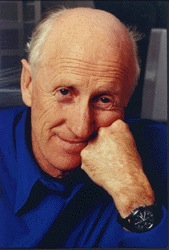To nothing less than the Whole Earth: "We are as gods"


Green Tech is about to observe a crucial anniversary. The first Whole Earth Catalog was published in 1968. Nearly forty years ago. Already the commemorations begin. The "New York Times" just published a book review of what may be the first of a series of books looking at Stewart Brand, the WEC and the trends and ideas that swirled around it.
I can remember reading those early catalogs, pieces on methane production before anybody coined the word "biofuel." Solar when it was a new technology, not yet a major investment opportunity. Wind power, geodesic domes, making organic yogurt at home, new ideas, new ways of seeing the planet and man's place on it, ecology and environmentalism before they became just another flavor to be marketed by political hacks.
And always a respect and reverence for the power of technology. Brand and his cohort wanted you to have "access to tools." Not trusting to government to get it right, the WEC wanted you to be able to do it yourself. Here's part of Brand's intro to the first catalog: "We are as gods and might as well get good at it. So far remotely done power and glory -- as via government, big business, formal education, church -- has succeeded to the point where gross defects obscure actual gains. In response to this dilemma and to these gains, a realm of intimate, personal power is developing -- the power of individuals to conduct their own education, find their own inspiration, shape their own environment, and share the adventure with whoever is interested. Tools that aid this process are sought and promoted by the Whole Earth Catalog."
Those were revolutionary words in an America dominated by an earlier war in Asia, the automobile and shopping centers (before the mall sprawl of today). Before the Internet was even conceivable. The WEC saw man as dominant but not just usurper or destroyer, but as partner and protector as well as the ultimate tool-maker.
It may be apocryphal but true enough, that Steward Brand campaigned and finally succeeded in getting the U.S. government to release the first photos of The Little Blue Marble, our planet, taken from outer space. That same picture then became the cover image of the WEC. As Brand had known, the image of our dinky planet whirling through black space was a powerful symbol for those interested in a whole Earth.
The WEC was always onto the next new technology. Personal computers, for example. A perfect fit for the WEC user. The first strong online community was The Well. Whole Earth 'Lectronic Link. A direct outgrowth of the WEC mentality. Here's a wonderful piece from "Salon" in 2000 when The Well turned fifteen. The Well was the spiritual and intellectual forebear of every online bulleting board, blog sites like this one, file-sharing, photo-sharing, video-posting site created.
A guy who knows a little bit about using tech and how it can alter the social and political landscape had this to say about the WEC: ""When I was young, there was an amazing publication called The Whole Earth Catalog, which was one of the bibles of my generation.... It was sort of like Google in paperback form, 35 years before Google came along: it was idealistic, and overflowing with neat tools and great notions."
Steve Jobs said that during his 2005 commencement speech at Stanford. It is quoted in the thorough wikipedia entry on the WEC. Wikipedia goes on to say, "Jobs also quoted the farewell message placed in the last page of the last issue of the catalog: 'Stay hungry, stay foolish'."
Many of the tech leaders who came of age in the 60s and 70s have acknowledged their debt to the WEC.
Now we have Google, and many of you too young to have read those catalogs, or maybe saw them moldering on your parents' bookshelf, can find how rich the WECs were, how new, how innovative. Some names to begin with are Stewart Brand, Whole Earth Review and Howard Rheingold. Here's what he had to say in the intro to the Millenium WEC more than ten years ago:
"The Millennium Whole Earth Catalog integrates the best tools from the past twenty-five years with the best tools for the next twenty-five years, including old Whole Earth Catalog standards such as environmental restoration, community-building, whole systems thinking, and medical self-care as well as new categories of resources such as backyard biodiversity, electronic mail, eco-tourism, and green investing.
"Watersheds are still important. Ancient forests are still important. Technology policies and cheap telecommunication software are important too, these days. Some people who are trying to take the world in their hands are out in the rainforests. Many world-changers are in cities and suburbs; they have tools and lore to share, too. Others are in cyberspace. Here are the field reports, recommendations, and reviews from the ethnobotanists in the Amazon and the cybernauts of the Internet.
"Given the tools we show you here, you (or your family, village, community) have the power to influence the thoughts and beliefs of others. The price of computing power has dropped so far since the first Whole Earth Catalog that we have entered the era of desktop everything: desktop publishing, desktop audio, desktop video. Book publishing, radio and television production, and music distribution used to require buildings full of heavy machinery. Communications capabilities that once were reserved for government or corporate elites now reside on tens of millions of citizens' desktops."
Happy Anniversary to all of us on The Whole Earth. May we wisely pass it on to the next generations.